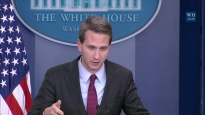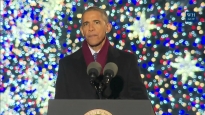President Obama Participates in a Roundtable Discussion on the California Drought
February 14, 2014 | 5:34 | Public Domain
President Obama participatse in a roundtable discussion with farmers and other local stakeholders affected by the drought in California.
Remarks by the President Before Roundtable Discussion
3:40 P.M. PST
THE PRESIDENT: I wanted to come here basically to listen. We're all equally dependent upon California producers for so many of your products in our lives*. As you know, Michelle wants us to use more of your products, not less. In fact, I think her Let's Move initiative has met with some of the producers to talk about how we can get our kids eating more produce, more nuts, more healthy foods. And because of the huge economic impact of what you do not just on California but the nation overall, there is a national concern around the drought that is facing California.
Now, as I'm sure Tom has shared with you and I think many of you know firsthand, we've been monitoring this for quite some time, and a whole host of our agencies have been coming in to interact with all of you and find ways that we can provide some immediate relief. But the truth of the matter is that this is going to be a very challenging situation this year, and frankly, the trend lines are such where it’s going to be a challenging situation for some time to come.
And as we were flying over those beautiful mountains of yours that are the source of traditionally so much water in this area -- and despite the rain and snow that had come just over the last few days, it was still looking fairly bare -- it gives you a sense that the baseline of water throughout the West, not just California, is going to be probably lower than what we've been accustomed to over the last hundred years. And that means we're going to have to make some decisions about how we conserve better, how we allocate water better, how we recycle water better, and how we cooperate more effectively not just in this state but throughout the region and around the country.
Now, water politics in California traditionally I know has been pretty easy -- (laughter) -- and I told the Governor I'm not going to wade into this because I want to get out of here alive on Valentine’s Day. (Laughter.) So my goal today and I think my administration’s goal generally is to try to facilitate and work with a whole range of stakeholders at the local level and see how we can find common ground to point to a new direction moving forward.
But I will say this: I think there’s a tendency, historically, to think of water as a zero-sum game, that either the agricultural interests are getting it, or urban areas are getting it, north, south. Given what we anticipate to be a significant reduction in the overall amount of water, we're going to have to figure out how to play a different game. And if the politics are structured in just such a way where everybody is fighting each other and trying to get as much as they can, my suspicion is, is that we're going to not make much progress -- particularly because Jim Costa told me if you want to guarantee yourself a job in California, become a water rights lawyer.
So what we can't afford I think is just years of litigation and no real action. And our hope is, is that we can convene a conversation that helps us move forward.
So I'm glad to be here. Even though I'm only going to be here for a little over an hour, what I am at the outset making a commitment to you is, is that we are going to stay on top of this, because it has national implications not only for our economy but we're also going to have to make sure that we weave in this issue of water in the West with the broader issues of climate change that are having an impact all across the country in different ways. There’s a connection between drought in the West and hurricanes along the Atlantic and coastal erosion. And what this all means is we're going to have to start rethinking our infrastructure and what are the projects that 50 years from now, 100 years from now, our children and grandchildren are going to be able to say we had the foresight to deal with these problems in a serious way.
And that's not going to be happening overnight. We'll try to get immediate relief right now, but we also have to have this larger conversation.
END 3:44 P.M. PST
|
December 2, 2016
|
December 2, 2016
|
December 2, 2016
|
December 1, 2016
|
|
December 1, 2016
|
November 30, 2016
|
November 30, 2016
|
November 30, 2016
|
- &lsaquo previous
- …
- 4
- 5
- 6
- 7
- 8
- 9
- 10
- 11
- 12
- …
- next &rsaquo







